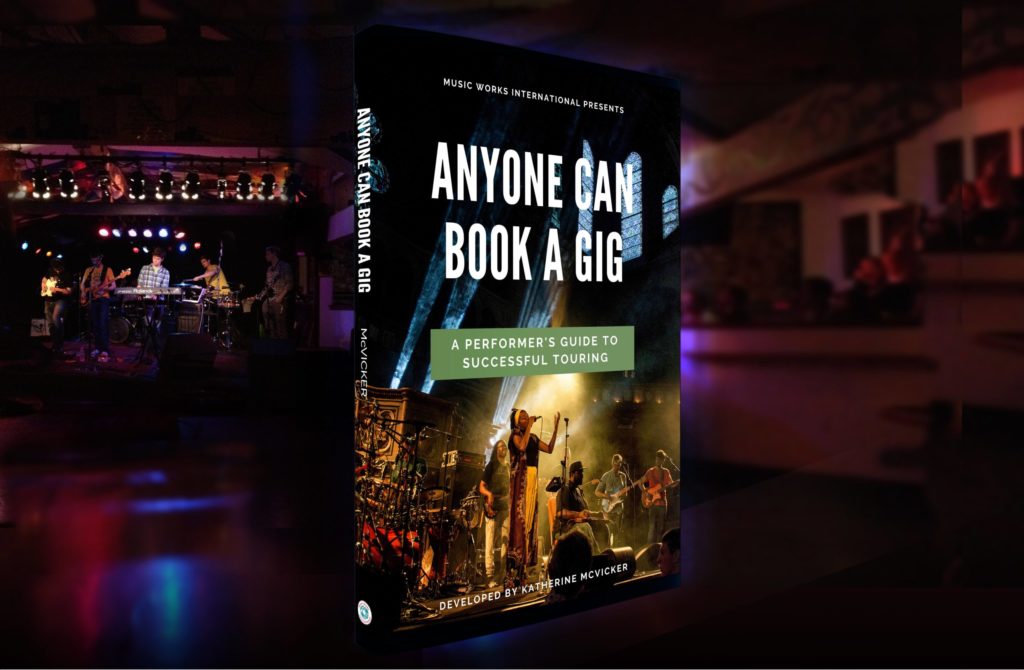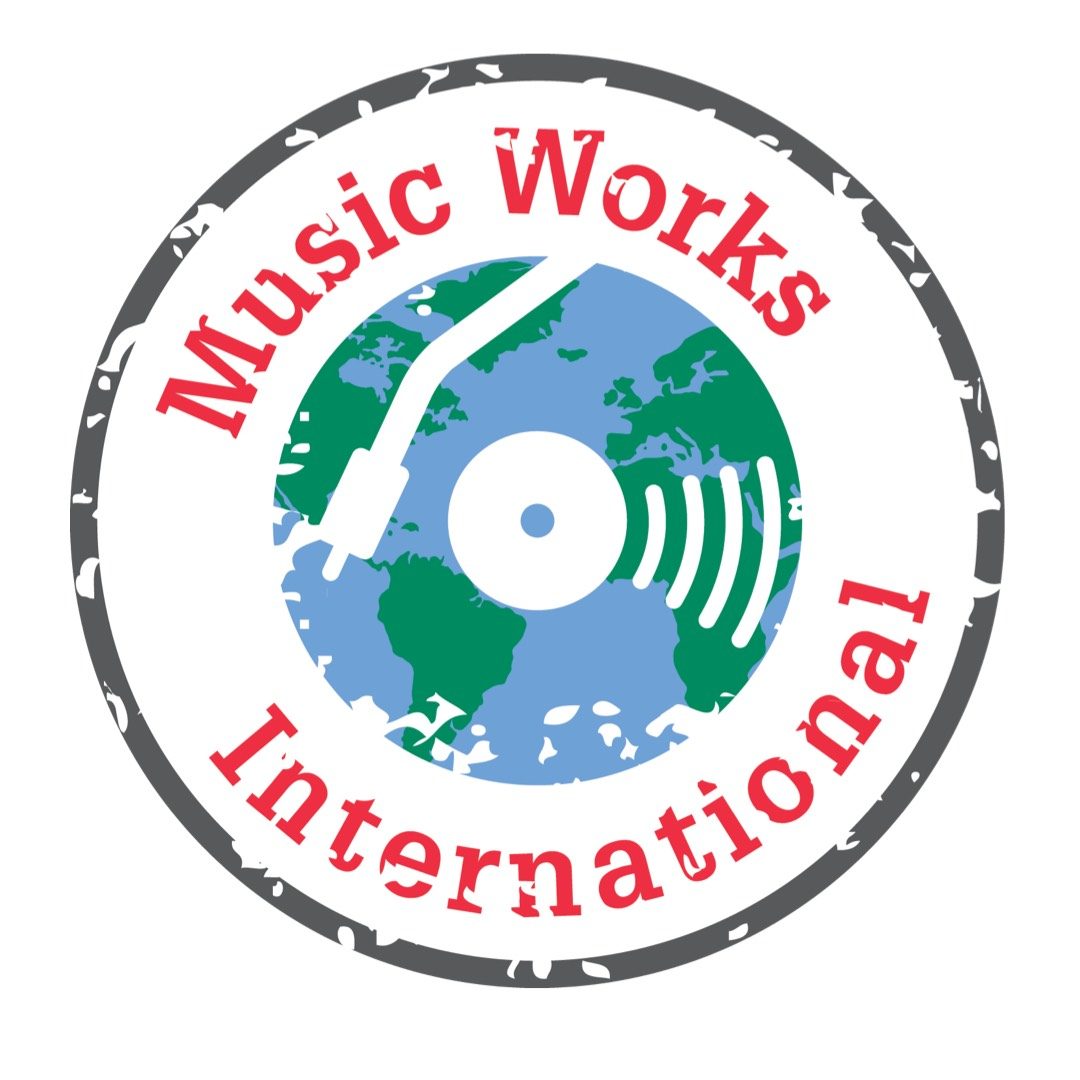By Katherine McVicker for DownBeat Magazine
There is an incredible amount of time, energy and money involved in launching any new artist. It may be difficult for an unknown artist to secure an agent, a manager or a record deal. In today’s music industry, it’s possible for an artist to pursue a music career without a label or a team. The explosion of social media platforms, streaming services, YouTube and the sheer amount of information on the internet makes it possible for an artist to release and promote music independently with the click of a button. The do-it-yourself model of today is incredibly valuable to those who must start their performing careers on their own.
Anyone Can Book a Gig is for any artist ready to start developing their professional career. The course explains how to assemble promotional/marketing materials, do research, make strategic plans to execute career goals, book concerts and tours, and promote your shows. In short, we teach you how to set up your business. The topics covered in Anyone Can Book a Gig are presented in easy-to-follow steps to give the artist a foundation of knowledge so he/she can book themselves.

Getting Started & Setting Up
The first step is an assessment guide to help you evaluate where you are in your professional career. It’s imperative to take inventory of your experiences and achievements, even if your experience has been limited to a recital at school or studies with a renowned teacher. When you know where you’ve been and what you’ve achieved, you can build on that and plan where you want to go next in your career. It’s also important to know how to describe your music. If you can’t describe your own music, how will you know how to market and promote it? All of these elements —educational/professional background, achievements, descriptions of your influences and of your music — are pulled together into an artist biography. This is your first chance to tell audiences of your accomplishments, skills and what makes you unique as an artist. The consumer is curious, they want to know who you are and why you do what you do: the influences, the motivations, the passion behind your projects. Every musician needs a biography in a series of formats. Both a long and short version should be on hand, as well as any project specific summaries for special projects or collaborations.
There are several other tools you need to set up your business in addition to a biography: photos, recordings, video links, EPK (electronic press kit), press reviews, quote sheets, a technical and contract rider, current and active social media pages, a website and any resume-worthy achievements related to music (workshops, masterclasses, past collaborations or projects). We go into great detail about these materials, which we call assets. You may not have all of these items when you start out, but knowing what you need will help you stay focused on compiling your press kit. Your promotional materials should showcase your brand and establish your portfolio.
What interest or age group are you trying to attract? What visual and audio materials best represent the sound of your music? Do you have any quotes or reviews about your music? Studio recordings are best. Get professional video recorded — not live video from someone’s cell phone. Put your best materials forward so they show you are professional and your production is high quality. If you take the care to make great materials you will also have them for others to help publicize your shows. Anyone Can Book a Gig guides you through how to create assets, organize and present them.
When you have all your assets organized into a folder, your materials are always ready at a moment’s notice to send to a promoter, to the media, to a graphic designer or anyone who is interested in your music. And do take the care to make sure all your links work before you send them out. With these professional assets and a clear message about your music, you will have the tools to book gigs, expand your fan base, and make money.
Research & Development
The next step in setting up your business is something all companies do. It’s worth doing some research to see what other artists, who are at or beyond your level, are presenting on their websites. Do they have a live video that captures the energy of their show? Do their photos and biography clearly indicate the kind of music they play? What do their concert postings look like? The internet is an endless source of inspiration and ideas you can use to promote yourself. Not only do you research how your competition is presenting themselves, you need to research where they are playing.
The next activity is to create a tour history and list of performance targets. If you have ever played a show, you have at least one entry for your tour history (a compilation of all your performances). A tour history is best organized in an Excel-type spreadsheet that captures the following information: date of show, name of venue, city, state and country (if you have played outside of the U.S.), ticket prices, the guarantee or fee earned, the number of tickets sold (you should always get the final ticket count after any show) and any comments about the venue for future reference. You may include a note about how many CDs you sold or any media events you did to support the show.
Agents and managers use tour histories to know where/when an artist has played, to create a strategy for future shows, and make improvements in fee and increases in ticket prices. Many artists don’t keep their tour books or keep information about their shows. This is a missed opportunity to keep information that will help you expand your bookings. As you build your tour history you will have the information at your fingertips when you are speaking to a promoter about your previous ticket prices and how many tickets you sold on past shows. Next, we add a new tab to your tour history and make your venue targets.
Research into venues and events as the wish list of where you want to play. Look for venues where bands similar to yours play. Your Excel sheet columns will look similar to the tour history. Make sure to record the details of the venue: capacity, usual ticket prices, who has played there recently, how many shows per night, contact for booking. Besides clubs, you will want to gather information about festivals and other kinds of gigs: local series, clubs or city events that have concerts. Generally, it’s a good idea to start locally then expand regionally. I like to make a list of the major cities and major events in a region — say, New England — and look for the best possibilities for the artist I’m working with. This is also the point where you should understand the terms used to describe the concert industry and the kinds of deals you can make for performances. Every industry has a lexicon. When you speak with the same terms as the promoter, you will communicate more clearly and demonstrate that you understand the business of live performance. We define dozens of terms you will encounter in your negotiations.
In this section of Anyone Can Book a Gig, we give you sample letters of solicitation as well as advice on how to approach promoters. We define dozens of terms you will encounter in your negotiations When you take the time to do your research, make a plan and learn the industry terms, you will be better equipped and more confident in your discussions with promoters.

Negotiation
Section 4 is about negotiation. All of us negotiate with each other in our daily lives. Bartering and making agreements goes back to the start of civilization. In my opinion, the best deals are when both sides benefit. I represent the artist so my role is to protect him/her and advocate for the best terms. That said, if a deal is too risky for the promoter because we have demanded too high a fee, over promised on the size of the audience who will buy tickets, or made the financial outcome too uncertain for the promoter, they may request a reduction in the fee or worse, cancel the show if the tickets don’t sell. This benefits neither the artist or the promoter. Negotiating financial deals in any business is based on speculation. When you grasp the concept of financial risk, you will be better able to work effectively with a promoter because you will be discussing the financial outcomes of a concert based on facts like ticket price, capacity, show costs, profit and loss, in short, a business deal.
When you create an agreement for a performance, you are entering a temporary business partnership with a promoter where he/she wants to make sure they don’t lose money, you want to be paid fairly and both of you benefit from a well sold show. Negotiation takes maturity, knowledge, diplomacy and practice. You will get better the more you do it. There are ways to reduce risk. This has the added benefit of helping you build solid relationships with promoters because it’s based on partnership with both sides having a stake in the outcome.
There are lots of different kinds of deals you can make. Common deals include a flat guarantee, a fee plus a percentage share of the profits after expenses, a guarantee versus a percentage of the profits, or a door deal with a high percentage where your fee is based solely on ticket sales. Each option has a different risk factor. Shows dependent on ticket revenue are called hard ticket shows. Hard ticket shows are where a fan buys a ticket to see your concert. In other words, you are the reason for the ticket sale. These shows are more risky because the finances are dependent on ticket revenue. Festival events are usually soft ticket shows where fans are paying to experience an event and your band is not entirely responsible for bringing in the paying audience. You will often be on a multi-act bill so it’s impossible to know which band brought the audience. In these situations, you will usually get a flat guaranteed fee. This means you get paid the agreed-upon amount regardless of ticket sales.

When you are developing your fan base, the soft ticket event can introduce you to new fans who might not know you otherwise. You are part of an event. After you perform at a festival, it’s important to return to that same city (or market) a few months later and play at a club to attract those new fans to see just your show. This builds your fan base.
The biggest factor that will impact your artist fee are the show costs. These include backline (the instruments and gear you need to play your show), marketing expenses, venue staff costs, costs for promotion and ticket costs. Your show has to sell enough tickets to pay the costs of putting the show on. You should have a technical rider to give to the promoter so he/she can see the production costs for your band. The rider can simply include stage plot, a list of backline needed and an input list.
Venues have different costs. Club costs are cheaper than theater costs. A club usually sells food and drinks which adds to the bottom line profit and can offset the cost for talent. Think about those two drink minimums on top of ticket costs when you go to a club in New York. A club may also have in-house backline: a piano (digital or acoustic), a drum kit, amps. Theaters, on the other hand, may be unionized or have to rent backline and sound systems. They have larger staffs and higher rents. These costs will also affect the ticket prices needed to cover costs. This is why artists usually start by playing clubs until they can sell enough tickets at a higher price to cover the greater costs to play a theater.
If you agree to a deal that includes a percentage of the profit after expenses, the promoter should tell you the costs or better yet, give you a show budget so you understand how many tickets have to be sold to cover expenses. Based on a reasonable calculation of income (how many tickets you think you can sell) less the costs, you will both know the level of risk for your show: how much money the promoter is willing to risk versus how many tickets you think you can sell. Often, developing bands are offered door deals which gives you performance opportunities but also requires you to partner with the promoter on a strong promotion campaign because your income is entirely dependent on ticket sales.
When your negotiation is finished and you have a deal in place, you should finalize everything in writing. An email confirmation with all the details is essential. Details should include the billing of the band (how you want to be advertised), the date, time, and place of the event, how many sets and what length, ticket prices, additional amenities the promoter is offering such as dinner or backline and the schedule for deposit and balance payments. Request that the promoter responds with agreement to your confirmation.
Contracts & Riders
Once you have your agreed-upon terms, the next step is to put all the details into a contract that both you and the promoter will sign. Most professional bands will also attach a rider that details essential information that won’t fit on your contract face — such things as policy on photography, comp tickets that are needed, hospitality like catering, hotel rooms or local ground transportation, and technical needs such as backline, sound and lights, stage and lighting plot. A rider should also state the policy of force majeure events — those things like natural disasters, sickness, civil unrest or other unforeseen circumstances that could cause one of the contracted parties to cancel the show. These are standard clauses in any performance contract.
Lastly, you may also issue invoices for the deposit and balance payments that state payment in cash or have your banking information and dates when the money should be paid. We have examples of riders, invoices and standard contracts in Anyone Can Book a Gig.
Marketing & Promotion
The final step in booking a show is described in the last section of the course. Section 6 gives you lots of ideas on how to guarantee a successful show/tour with great marketing and promotion samples and strategies. We give you tips on how to be your own publicist, build a database of local media contacts, create press releases and plan a marketing campaign. We give some information on streaming services and on building your fan base.
This is another area where you can work in partnership with a promoter. The promoter should tell you what they have planned to promote the show (their marketing plan) and you can add in your efforts, too. Promotion and Marketing are courses unto themselves and there are many professionals who specialize in these areas. The information we offer will get you started in thinking about effective ways to grow your profile, your brand and your fan base. Once you have your self assessment, your tool box of marketing assets together, you’ve done your research, and created your plan,you will be ready to solicit your project, negotiate deals, create and understand contracts and riders, and execute successful promotion and marketing plans to ensure successful outcome of your shows and tours.
Remember, it took you many years to become a great musician. We have only scratched the surface with this summary of Anyone Can Book a Gig. The course has dozens of worksheets, samples, examples and more than 200 pages of text to help you get your career — your business — started. Ultimately, it is up to you to direct your performance career. So much of any entertainment career is based on luck, but with knowledge and experience, you can make your own luck. Though it takes time and consistent effort, you will be a better advocate for your interests if you take the time to learn the business. There is no one better qualified, better informed and better equipped to take the lead than you yourself.
For more information, visit the website http://anyonecanbookagig.com.

